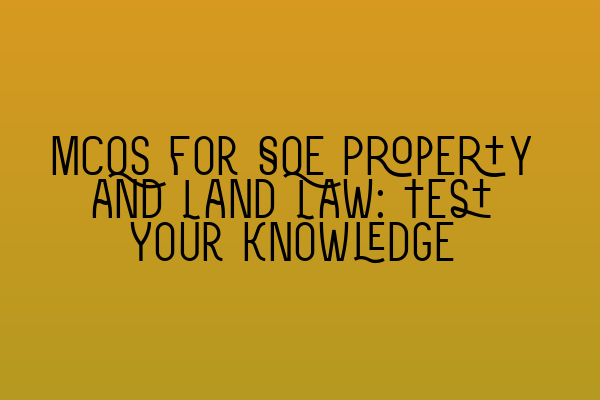MCQs for SQE Property and Land Law: Test Your Knowledge
Welcome to our blog post on MCQs (Multiple Choice Questions) for SQE (Solicitors Qualifying Examination) Property and Land Law. This post is designed to test your knowledge on key concepts and principles in property and land law. Whether you are a student preparing for the SQE or a legal professional looking to brush up on your knowledge, these MCQs will challenge and expand your understanding of this important area of law.
Before we dive into the MCQs, it’s important to note that property and land law involves the legal rights and obligations associated with real property, including land, buildings, and other structures. It covers a wide range of topics, from ownership and transfer of property to landlord-tenant relationships and easements. Let’s begin!
1. Which of the following is a type of ownership interest in land that lasts for an uncertain duration?
A) Fee simple absolute
B) Life estate
C) Leasehold estate
D) Easement
2. Under which doctrine can a property owner acquire title to another person’s property by openly using it for a certain period of time?
A) Adverse possession
B) Eminent domain
C) Escheat
D) Condemnation
3. True or False: In a joint tenancy, if one co-owner dies, their interest automatically passes to the surviving co-owners.
A) True
B) False
4. Which of the following is not a required element of a valid lease?
A) Offer and acceptance
B) Consideration
C) Written agreement
D) Competent parties
5. In landlord-tenant law, what is the term for the illegal eviction of a tenant by the landlord?
A) Constructive eviction
B) Actual eviction
C) Unlawful detainer
D) Self-help eviction
6. Which of the following is a legal document that transfers ownership of real property from one party to another?
A) Deed
B) Lease agreement
C) Mortgage
D) Title insurance
7. True or False: Easements can be created by prescription, similar to adverse possession.
A) True
B) False
8. What is the term for the right of a government to take private property for public use, with fair compensation to the owner?
A) Eminent domain
B) Escheat
C) Condemnation
D) Abandonment
9. Which of the following is an example of a restrictive covenant on property?
A) Prohibiting the use of the property for commercial purposes
B) Requiring the property owner to maintain a certain aesthetic standard
C) Dictating the number of occupants allowed in the property
D) All of the above
10. True or False: When a lease expires, the tenant has no further rights to occupy the property.
A) True
B) False
That concludes our set of MCQs for SQE Property and Land Law. Now let’s review your answers and see how well you did. But before that, if you’re looking for more practice questions and study materials for the SQE, check out our interactive mock tests for Contract Law.
Related Articles:
– Interactive SQE Mock Tests for Contract Law: Test Your Knowledge
– Parties in a Contract: Rights and Responsibilities
– The Importance of Ethics in Contract Law: A Comprehensive Guide
– Unveiling Duress and Undue Influence in Contracts
– Essentials of Consideration: Understanding the Backbone of Contracts
Now let’s review your answers:
1. Correct answer: C) Leasehold estate
2. Correct answer: A) Adverse possession
3. Correct answer: A) True
4. Correct answer: C) Written agreement
5. Correct answer: D) Self-help eviction
6. Correct answer: A) Deed
7. Correct answer: A) True
8. Correct answer: A) Eminent domain
9. Correct answer: D) All of the above
10. Correct answer: B) False
How did you do? If you got all the answers correct, congratulations on your excellent knowledge of SQE Property and Land Law! If you missed a few, don’t worry, this is a great opportunity to further explore and deepen your understanding of these concepts. Study the related articles we have provided for a more comprehensive understanding of the topics covered in this quiz.
Stay tuned for more quizzes and study materials to help you prepare for the SQE and excel in your legal career. Good luck!
